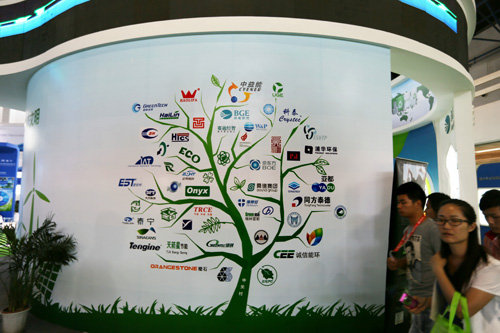Thinking differently on growth
Updated: 2013-10-09 15:29
(bjreview.com.cn)
|
||||||||
|
 Visitors stop by the booth of Zhongguancun Science Park at the 13th China International Environmental Protection Exhibition & Conference held in Beijing on July 23. The park has 1,500 enterprises engaged in energy conservation and environmental protection. [Photo / CFP] |
GDP should not be the focus of development
The constant scrutiny by Wall Street and policy makers of countries' GDP growth can distort development incentives and result in disastrous unintended consequences. Clearly, for a country to prosper, sufficient economic activity must be generated in order to employ greater numbers of people and to improve the overall standard of living for society. However, GDP was developed as a measure decades ago, and it has many shortcomings that can make it a poor measure of quality of life. Instead, economists and policy makers should focus on other indicators and develop new models for measuring a country's development progress which is possible with today's technology and big data.
GDP is the sum of all the financial transactions for products and services within a country's borders. The first problem with this measure is that with many companies operating in multiple countries, the profits that accrue do not necessarily stay within a country's borders. In fact, arguably a majority of the profits of multinational firms flows back to the country of origin so that even if China's consumers spend a great deal in China, a large percentage of those profits will not accrue to anyone in China but to foreigners instead. For instance, Nike may hire Chinese workers to produce its shoes, have stores in China to sell its products, and only Chinese people buy from those stores. In essence, 90 percent of the economic activity happens in China and gets recorded in China's GDP. However, the majority of the profits of Nike goes back to the owners in the United States even if none of the economic activity happens in the United States. The national wealth measure is distorted because it would seem that China is getting richer and the United States is getting poorer when the exact opposite is true.
Secondly, GDP does not show distribution of income. A company that creates a lot of income from production does not show how that income is being distributed. We know that the majority of profits accrue to very few individuals and that the income inequality is wide in China. A focus on GDP can make matters worse since it can encourage more production by certain wealthy individuals who do not share their profits generously with their employees which will hinder healthy economic development.

 Rare look in Shaolin temple
Rare look in Shaolin temple
 Last photos of Hungarian wingsuit diver
Last photos of Hungarian wingsuit diver
 In photos: Typhoon Fitow aftermath
In photos: Typhoon Fitow aftermath
 Japan-US military drill raises tension
Japan-US military drill raises tension
 Higgs and Englert win physics Nobel prize
Higgs and Englert win physics Nobel prize In Bali, they relax in local fashions
In Bali, they relax in local fashions
 Post office for Liaoning carrier opens
Post office for Liaoning carrier opens
 A smog-filled Beijing targets polluting cars
A smog-filled Beijing targets polluting cars
Most Viewed
Editor's Picks

|

|

|

|

|

|
Today's Top News
China predicted to be largest tourist market for US
Peace is in China's DNA: says ambassador
Xiaomi's Barra ready to take on Beijing
A day of cultural exchange at Pace University
ZTE, Houston Rockets shooting for global markets
Global firms facing HR challenges in Asia
Shops court Chinese with Mandarin
Back to 1942, entered for the 86th Oscars
US Weekly

|

|







